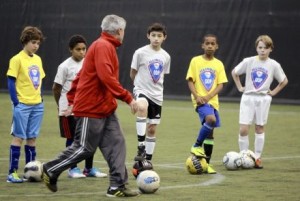How to Be the Soccer Coach Every Kid Dreams About
 Do you remember what it was like to play soccer as a kid? Did you idolize your coach, or did you dread the thought of each practice and game? Did you imagine yourself growing up to be a soccer star, playing at some of the most famous stadiums in the world? Did you dare to dream? Did you learn the art of the game?
Do you remember what it was like to play soccer as a kid? Did you idolize your coach, or did you dread the thought of each practice and game? Did you imagine yourself growing up to be a soccer star, playing at some of the most famous stadiums in the world? Did you dare to dream? Did you learn the art of the game?
Chances are if you had a good coach, you learned not only how to play soccer, but some valuable life lessons along the way as well. If you now have kids of your own, you can appreciate the importance of having an inspiring coach. A good coach is just as important as having the right equipment. You wouldn’t have your child play without knee pads, cleats and other footwear, or apparel such as a jersey and shorts. Whether you purchase your child’s soccer uniform and accessories from an online retailer that specializes in all things soccer, like Soccerloco, or from your local secondhand store, the most important factor is that your child has fun. That all starts with dressing the part of a soccer player and having a great coach.
If you’re a coach, you no doubt want to be the best coach you can be. Being part of the National Soccer Coaches Association of America (NSCAA) and attending the convention can help you become an inspiring and respected coach in your community.
Attendance at this conference will teach you how to be a good coach – but what does that really mean? What attributes does a good coach have? Here are a few examples:
· A good coach inspires his team: As a coach, it’s your responsibility to bring your team to heights they never imagined. Build up their confidence, let the kids know they can do anything they dream of if they work hard enough, and give them the inspiration they need to win.
· A good coach instills a sense of responsibility and teamwork: No matter how old your team members are they can learn early on that being on a team means thinking of others and being a responsible teammate. You can teach them to encourage their teammates and treat them as if they’re family.
· A good coach teaches and uses constructive criticism: Some coaches believe in ‘tough love’ when it comes to winning a game. But good coaches know that while they need to push some limits, constructive criticism will have a long lasting effect, especially with young children.
· A good coach knows the value of fun: Being a kid should be fun; while you need to teach them the rules of the game, they need to feel that what they’re doing is fun and recreational. After all, they spend most of their days in school where the curriculum is rigid. They need time to unwind and playing soccer is a great way to have some fun and get some much-needed exercise.
Above all, a good coach inspires kids to visualize their future and helps encourage them to follow their dreams. Do they want to be a soccer superstar? Maybe they envision playing the center position or jet setting around the world with nothing but a soccer ball. Your job as a coach is to fuel their fire and ignite their passion. Let them know that if they want it bad enough they can achieve any goal, any dream. They can play in any stadium they choose and become the superstars they envision themselves to be.
It may sound like a lot of responsibility, but kids are worth it. As a community, we all must teach our children that no dream is too big, that no goal is too out of reach.